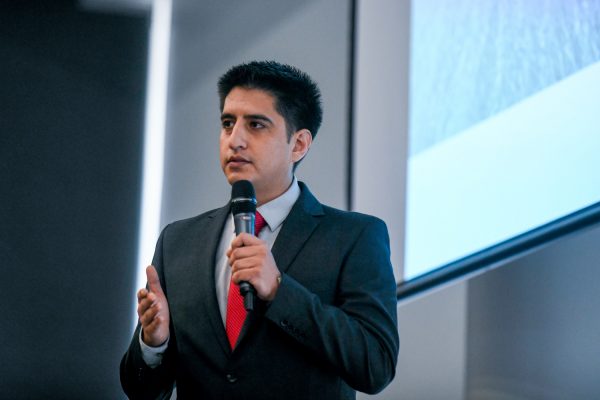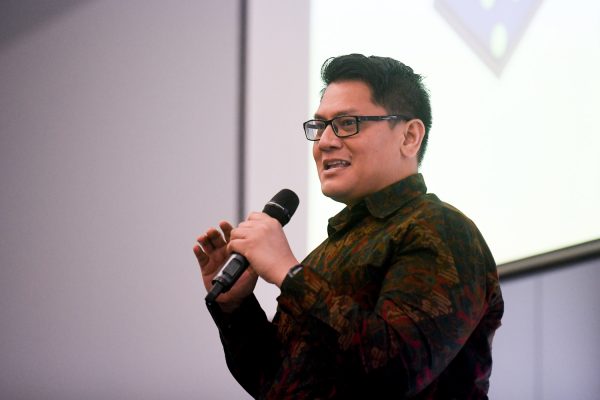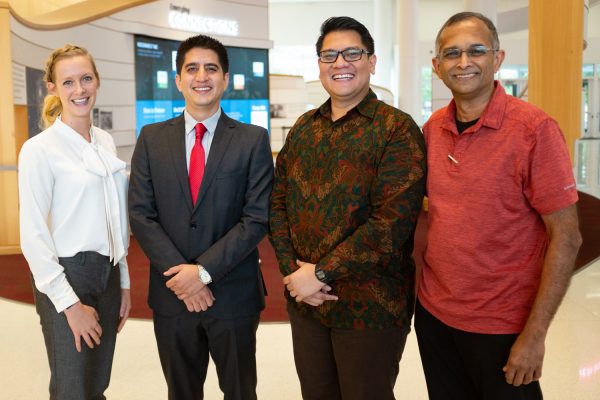How can food banks determine the optimal method of distribution to assist the millions of children and adults who go hungry every year? Can we use seawater instead of fresh water for concrete production, and how would it affect the long-term behavior of the concrete? Can body heat be converted to electricity to power personal health monitoring devices?
These are just a few of the research topics highlighted during the recent 3 Minute Thesis (3MT) competition. This is the fifth year that the Graduate School at NC State has held this contest for Ph.D. students to present complicated material to an audience not familiar with the topic. Presenters are urged to use non-technical language and describe the significance of their research findings, in 3 minutes. They can use only one static visual. The 3MT competition began in 2008 at the University of Queensland in Australia, and is now held annually at over 200 universities worldwide.
College of Engineering and CCEE well represented
Of the ten finalists chosen from a preliminary group of 25 contestants, five finalists were from the College of Engineering, including two from our Civil, Construction, and Environmental Engineering (CCEE) department! All three winners were from the College of Engineering.

The two CCEE Ph.D. students’ presentations were focused on either preserving or creating clean drinking water. Francisco Jativa, mentored by Dr. Mohammad Pour-Ghaz, is researching the potential to make concrete by using seawater, instead of freshwater and he tries to understand the potential long-term implications of such practice. He told the audience that the amount of freshwater used in 2018 to produce concrete was a staggering 2.5 billion cubic yards – roughly akin to the amount of water dropping from Niagara Falls for 9 straight days. As Francisco concluded his three minutes, he told the audience that “in this short 180 seconds that I have been talking to you, around 300,000 families in Africa could have had 2 days of drinking water if we used seawater as a replacement for concrete production.”

Ph.D. student Elvin Hossen, mentored by Dr. Douglas Call, reminded the audience that our planet is becoming ‘thirstier’, and that already one hundred million people rely on unconventional sources of drinking water, including desalinized saltwater. Hossen is researching an emerging technology called Capacitive Deionization, or CDI, which has the potential to create drinking water using less energy than other processes, and without the cost of expensive membranes.

Practice pays
Dr. Ranji Ranjithan, Director of Graduate Programs for the CCEE department, and Dr. Meagan Kittle Autry, Teaching Assistant Professor and Director of Graduate Professional Development, coached our CCEE students interested in participating in the 3MT. “First, we held a brainstorming session so students could just talk through their ideas,” Ranjithan said. “I met with students one-on-one to help them think about effective metaphors and accessible language to make their information interesting to an audience,” Kittle Autry added. The CCEE department also held a mock session in which Ranjithan and Kittle Autry served as judges. “We held our own department 3MT competition with the same format in the spring of 2019, and will hold it again in 2020,” Ranjithan said. “We place great emphasis in encouraging our graduate students to present their research in language that is accessible to a non-engineering audience, which might include the public, policymakers, or potential funders.”
Read more about the 3MT competition here including a list of all participants, and the judges, and access to a photo gallery from the event.

